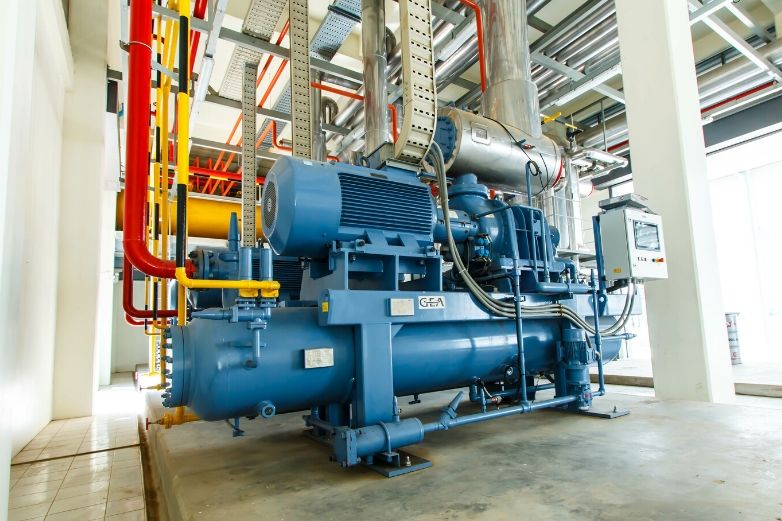Introduction
As the demand for cold storage and processing grows in industries such as food and beverages, pharmaceuticals, and chemicals, the importance of industrial refrigeration systems is undeniable. These systems play a crucial role in maintaining the right temperature, which is inevitable for the quality and safety of products. This article aims to provide a comprehensive guide to industrial refrigeration systems, discussing various types, processes, components, benefits, maintenance, and the future of these systems.
G’day mate! Have you ever given a thought to what keeps your favourite beverages cool? Or how perishable goods are stored for long periods without getting spoiled? Well, the answer lies in industrial refrigeration systems.
Industrial refrigeration systems are vital to many industries, playing a crucial role in areas such as food and beverage manufacturing, chemical processing, and cold storage logistics, to name a few. These systems aren’t your typical household fridge, they’re complex and come in a variety of types to meet different industrial requirements.
The most common types include mechanical compression refrigeration systems, absorption refrigeration systems, and evaporation refrigeration systems. Mechanical compression systems, the most widely used, use a compressor to condense refrigerant, then evaporate it to absorb heat and reduce temperatures. Absorption refrigeration systems function similarly but use a heat source to facilitate the absorption process. Lastly, evaporation refrigeration systems utilise the natural evaporation process to cool the environment.
Each type has its pros and cons, and choosing the right one depends on factors such as energy efficiency, environmental impact, and cost-effectiveness. So next time you enjoy a chilled beverage or relish a preserved delicacy, remember the unsung hero – the industrial refrigeration system.
1. An Overview of Industrial Refrigeration Systems
Industrial Refrigeration Systems are integral to many industries for processing, storing, and transporting goods at controlled temperatures. They range from small-scale units cooling a single room to large-scale systems cooling entire factories. A well-designed and maintained industrial refrigeration system can greatly impact the integrity of products, operational efficiency, and overall business profitability.
2. Types of Industrial Refrigeration Systems
There are several types of industrial refrigeration systems, each with its own set of advantages and applications. These include:
– Vapor Compression Refrigeration: The most common type, using mechanical energy to compress refrigerant vapor.
– Absorption Refrigeration: It uses a heat source, like steam or hot water, to generate cooling.
– Evaporative Cooling: It cools air through the evaporation of water.
– Ammonia Refrigeration: It uses ammonia as the refrigerant, ideal for large-scale industrial applications due to its efficiency and environmental friendliness.
3. The Industrial Refrigeration Process
The industrial refrigeration process involves a series of steps, including the evaporation of a refrigerant at a low temperature and pressure, compression of the refrigerant vapor, condensation of the vapor at high temperature and pressure, and expansion of the high-pressure liquid refrigerant. This cycle repeats, maintaining a continuous cooling process.
4. Key Components of Industrial Refrigeration Systems
Industrial refrigeration systems consist of several key components, including:
– Compressor: It compresses the refrigerant, raising its temperature and pressure.
– Condenser: It cools the refrigerant, turning it from gas to liquid.
– Expansion Valve: It controls the amount of refrigerant going into the evaporator.
– Evaporator: It absorbs heat, allowing the refrigerant to evaporate and provide cooling.
5. Benefits of Industrial Refrigeration Systems
Industrial refrigeration systems offer numerous benefits, including:
– Product Quality Maintenance: They help maintain the quality of products by preventing spoilage and decay.
– Operational Efficiency: They enhance operational efficiency by maintaining optimal temperatures for different processes.
– Energy Efficiency: Modern systems are designed to be energy-efficient, reducing operational costs.
6. Maintenance of Industrial Refrigeration Systems
Regular maintenance of industrial refrigeration systems is vital for their optimal performance. It includes regular checks and servicing of components, timely replacement of worn-out parts, and preventive measures to avoid potential breakdowns.
7. The Future of Industrial Refrigeration Systems
The future of industrial refrigeration systems looks promising with advancements in technology. The focus is on developing energy-efficient, eco-friendly systems with IoT integration for real-time monitoring and control.
Conclusion
Industrial refrigeration systems are an integral part of numerous industries. Understanding their types, processes, and benefits can help businesses make informed decisions about their refrigeration needs. As technology advances, these systems are expected to become more efficient and eco-friendlier, ensuring a sustainable future.
